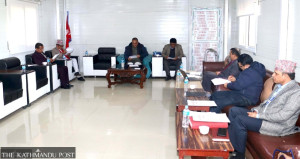Sudurpaschim Province
Construction work on Rayal-Thing road segment puts locals at unease
Villagers remain wary and question the sustainability of these infrastructural development projects..jpg&w=900&height=601)
Basant Pratap Singh
After the main irrigation canal was destroyed during the construction of the Rayal-Utkadi-Thing road segment in 1984, residents of Rayal Jyulo, a small village in Kedarsyu Rural Municipality, were barred from carrying out any agricultural activities. Although the canal was later rebuilt during the Second Hill Irrigation Project, it was again destroyed during the construction of Jaya Prithvi Highway in 1995. Since then, agricultural activities in eight neighbouring villages—Seku, Dudil, Kanada, Sajh, Bagal, Rayal, Chaudala and Palikhet— have dwindled.
In order to combat the problem, two years ago, the villagers of Rayal came together to build an alternative canal. But that too was destroyed when the reconstruction of the Rayal-Utkadi-Thing road segment started.
However, the villagers worry that the lack of water is just the beginning of the mounting problems the road reconstruction work has brought about. They are now concerned that the construction work may disrupt traffic along Jaya Prithivi Highway, the only road that connects Bajhang to its neighbouring districts.
“The construction work has exposed the highway to landslide risks,” said Dipesh Bhandari, a local resident.
But Ashok Malla of the Kalika, Chandra and Basanta JV, the company responsible for the reconstruction of the highway, says that the road construction works are taking place according to the directions provided by the Road Division Office in Bajhang.
“We carry out the construction as per the markings made by the Survey Department under the Road Division Office,” he said. “It is the division’s job to evaluate the safety concerns.”
Dan Bahadur Chand, an engineer at the Seti Lokmarg Uttarkhanda Project, which was responsible for the road segment’s survey, says that various measures have been taken to prevent landslides along the highway.
“We will build walls using bioengineering techniques to minimise disasters,” he said.
However, despite assurances from the concerned authorities and the contractor company, the villagers remain wary and question the sustainability of these infrastructure development projects.
For the last 23 years, the affected villagers have been forced to leave their agricultural lands uncultivated for lack of water. They had over the period of time used temporary measures to irrigate their lands but these measures bore little results.
Jyulo Village was regarded as having the most fertile swathes of land to grow paddy before the road construction destroyed the main irrigation canal sourced from Juligaad and Patichada.
Jaya Bahadur Malla, a local resident, said that the villagers had repaired the canal using their own wits and resources, but the structure did not last long.
“We again made some repairs but they didn’t survive this year’s monsoon,” he said.
Malla hopes that the irrigation canal will be repaired permanently come this winter season.
Due to lack of water resources, many have resorted to growing bhuwa (a poor variety of paddy) and corn instead of rice, according to Malla.
The destruction of irrigation canal have severely affected 111 families in Rayal alone. Meanwhile, the authorities concerned have been passing the buck to one another, raising doubt among the locals that the canal may never be repaired.




 20.12°C Kathmandu
20.12°C Kathmandu















